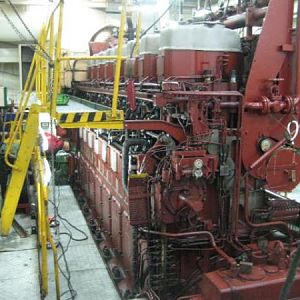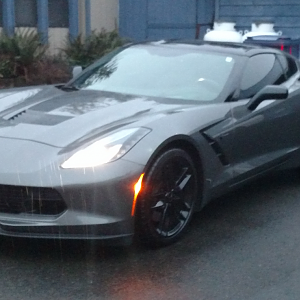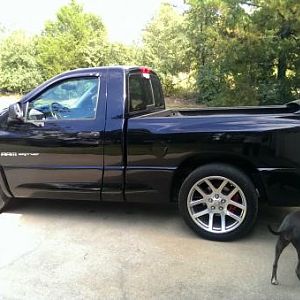Bummer about the boat.Hope ya get her fixed.
Why boats sink, Part Two—inboard/outboards
Boat/US Magazine , Nov, 2007 by Chuck Fort
Email Print
In the November 2006 issue of BoatU.S. Magazine, Part One of "Why Boats Sink, Outboard Powered Boats" appeared. This is Part Two, focusing on why inboard/outboards sink.
Inboard/outboard (I/O)-powered boats and outboard boats are similar in design; some manufacturers sell the same boat with a choice of I/O or outboard power. However, research by Seaworthy on insurance claims revealed that the reasons for sinkings are vastly different.
While outboard-powered boats tend to sink at the dock due to cockpit arrangements that allow rain to accumulate faster than it can be drained by the scuppers, I/Os' weak link--44% of the time--is the rather delicate connection between the inboard engine and the outdrive known as the bellows.
And while outboards sank underway 32% of the time due to taking water over the gunwales or, most often, the transom, I/Os sank underway 36% of the time due to striking a submerged object.
The bellows or boots--pleated, flexible rubber membranes--run between the engine (the "I") and partially submerged outdrive (the "O") to seal the transom where cables and shafts pass through. They work well, but have one weakness: Bellows have a limited lifespan. Many boats have more than one bellows (driveshaft, shift cable, exhaust, etc.), any one of which has the potential to sink the boat. The study showed that bellows leaks account for 44% of sinkings at the dock and 20% of the sinkings underway. A bellows that is over five years old is living on borrowed time.
All bellows should be carefully inspected for cracks at least annually, more often in a hot, sunny climate. If one bellows shows signs of wear, all of them should be replaced.
And don't take any chances with bellows clamps; replace them whenever the bellows are replaced.
Thirty-six percent of underway sinkings in the study were caused by boats hitting submerged objects such as a rock, a sandbar or a floating log. A woman in Florida hit an alligator with her 19-foot boat, which immediately started taking on water. Not wanting to sink near an angry alligator, she gunned the engine and made a mad dash toward shore. The boat sank a few feet from land, and the woman was able to walk to safety ashore.
Extra vigilance is required after heavy rains, when debris is most likely to wash into the water. On the flip side, lake drawdowns can expose such things as previously hidden stumps; reduce speed and check with the local water authority to find schedules. And slow down in unfamiliar areas; it's better to mangle a prop than tear off an outdrive.
[ILLUSTRATION OMITTED]
The Seaworthy study also found that 15% of dockside sinkings were caused by water back-flowing through the scuppers into the boat. Rain will add a lot of weight quickly if the scuppers are clogged, and it is especially important with low-profile boats to use a garden hose to keep them clear and free-flowing. If you opt to wet-store your boat over the winter, plan on visiting frequently to make sure snow and ice aren't collecting in the cockpit. An alternative is to fit the boat with a snug cover that directs water and snow overboard. Finally, a high-water alarm is also useful, but make sure the battery stays fully charged so it can be heard.
One cause of sinking that isn't unique to I/Os are leaks from below-waterline fittings. Only bronze and Marelon fittings meet the American Boat and Yacht Council (ABYC) standards. A few sinking claims were caused by overheated engines melting rubber exhaust pipes. Anytime the engine overheats, exhaust hoses and clamps should be carefully checked.
Poor docking arrangements accounted for 11% of I/O sinkings. In some cases, a boat's outdrive snagged on the dock at low tide and then caused the boat to fill through the scuppers as the tide came in. These types of sinkings can be prevented by making sure lines to the boat are tight enough to keep the boat safely away from the dock, but also loose enough to allow for tides. Spring lines can help; so can flexible fiberglass mooring whips. Note that when all else fails, it may be easier to simply move the boat to a larger slip.
A few sinkings also occurred because someone forgot to insert the drain plug when the boat was launched. When that someone is likely to be you, a simple way to jog your memory is to tie the plug to your ignition key.
Because their transoms don't require cutouts, boats with I/Os aren't as vulnerable to taking water over the transom or gunwales as their outboard-powered counterparts (32% for outboards). But, I/Os aren't immune to swamping--12% sank from taking water over the transom or gunwales.
Great Fall Reading--Seaworthy, the 274-page book by editor Robert Adriance, Jr., collects the best true stories from 20 years of BoatU.S. insurance claims files. To order a copy, go to Amazon.com. Subscriptions to the quarterly magazine Seaworthy are $10 per year. For more information, go to BoatUS.com/Seaworthy or call 703-823-9550, ext. 3276.










